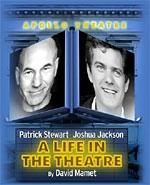A Life In the Theatre
David Mamet's play, premiered in 1977, takes us behind the scenes of an American rep where the action focuses on two members of the company: Robert (played by Patrick Stewart) and John (played by Joshua Jackson).
We first meet them 'backstage' after a performance where they're discussing how the show went. It seems they have only recently started working together, because their comments are guarded, and each seeks to avoid criticising the other's performance. But they soon join forces in catty remarks about the leading lady. It's a humorous and tantalising exchange to start the play. For example, in discussing the audience's reaction to their production, Stewart remarks how "acute" they were and that they obviously "saw a better show than the one we rehearsed".
In the rest of this short play (the running time is about 1 hour and 25 mins with no interval), we're treated to glimpses of the two actors in their dressing room and in an assortment of roles on stage in rep which show their life in the theatre as well as their developing relationship. Most of the 'nightmares' of theatrical life are shown in short 'snapshots'. Forgotten lines, missed cues, practical props which don't work, and the tedium of having to breathe life into dreadful scripts all provide humorous devices, most notably for Patrick Stewart since he invariably ends-up wearing tatty wigs and has to go 'on-stage' with a safety pin in his trousers when his zip gets stuck. And he also has the most memorable lines - for example, when they're acting a scene on a raft and John asks Robert what their chances of survival are, Robert says "We haven't a hope in hell - but don't let it get you down".
The fundamental difference between the two 'actors' is in their ages. Robert is in his later years, perhaps around 60, whereas John's career is just about to 'take-off' (if his back-stage telephone conversations are to be relied on). Robert tries to pass on his knowledge and experience to John in contrived theatrical language ("we mustn't be afraid of process" he tells John in the gym one day). But John receives this wisdom reluctantly, eventually telling Robert to "shut up" when he's droning on in their dressing room while John is trying to read. But that's as far as the tension really goes. It's all a bit subdued and tolerant. I'd expected the tension between the two characters to build considerably as the play progressed, perhaps with a blazing row or 2 developing, to reflect the oppressiveness of working in such close proximity and the struggle between experience on the one hand and the young 'upstart' on the other. But it never did.
Instead, as 'A Life In The Theatre' unfolds, its main theme seems to be the insecurity actors like Robert have to face in their later years. He's not only frightened of the future because his career's in decline, but alarmed at how quickly it all sped by. In his programme comments, Mamet seems to indicate that this is something special that actors must face. But of course it's not. In the results-focused ethos of modern employment, almost everyone is forced to face the reality that their career won't go on or be successful for ever.
Stewart certainly has the better of the two roles (even though he's portraying an actor whose 'career' is supposed to be in decline), and brings his considerable talents to bear in describing Robert's growing fear and anguish. Joshua Jackson's role is blander in contrast, but nevertheless, he manages to 'milk' the role whenever possible (most notably in the drawing room scene when he's talking about autumn at the window, as well as in his fawning to agents on the telephone). And both have to work hard since they're on-stage for the duration of the play, and cope admirably with the numerous costume changes as well as the shifts of gear as they move from 'backstage' to 'acting' scenes.
As a two-man show, 'A Life In The Theatre' successfully commands the attention of the audience, and it's enjoyable as well as humorous (without being hysterically funny). But for me, the promise of the opening scene was never really developed or realised in the relationship between the two characters, and I left with a distinct sense of a missed opportunity and the impression of an unnecessarily sentimental ending.
What other critics had to say.....
NICHOLAS DE JONGH for THE EVENING STRANDARD says, "The main trouble, apart from the muted direction, is the casting..Patrick Stewart and Joshua Jackson... are about as compatible as roast beef and a knickerbocker glory." BENEDICT NIGHTINGALE for THE TIMES says, "DAVID MAMET'S Life in the Theatre lasts 85 minutes, but, unlike some pieces that are aeons longer, it packs three plays into its short, enjoyable span." PAUL TAYLOR for THE INDEPENDENT says, "Patrick Stewart is wonderful....Unfortunately, neither the excellence of the directing, nor the slow-burn drollness of Joshua Jackson's performance can disguise the anorexic dramaturgy that is on offer here. You leave the theatre thinking: where's the show?" MICHAEL BILLINGTON for THE GUARDIAN says, "Perfectly enjoyable." CHARLES SPENCER for THE DAILY TELEGRAPH says, "Proves funny, affecting and, by Mamet's macho standards, unexpectedly tender."
External links to full reviews from popular press
The Times
The Guardian
The Independent
Telegraph
Originally published on
